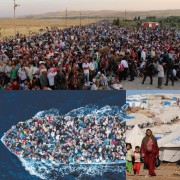WPA Discussion Document on Refugees January 2017
On the initiative of the of the Section of Transcultural Psychiatry, World Psychiatric Association, in September 17th, 2016 mental health professionals from Syria, Turkey, Germany, Austria, the United Kingdom, Spain, the Netherlands, Denmark, Sweden, Norway and Finland attended and presented at the Symposium “People on the Move: asylum seekers and refugees”. Moreover presentations were held or made available from the University of Amsterdam and the NGO’s Medicin Sans Frontiere and the Red Cross Red Crescent. The presentations and discussions revealed an insight in the mental health situation and policies of health authorities and governments concerning asylum seekers and refugees in the various countries. The overall conclusion is that the ongoing tragedy in Syria is beyond words and creates a huge risk for (longlasting) mental health problems in large parts of the population. Research shows high prevalence rates of mental disorders, in adults as well as in children. The responses of governments and other policy makers appeared to be quite different in the various countries. There are difference e.g . in fulfilling basic needs (eg financial support), access to health services, access to the housing and labour market, attention to vulnerable groups (young children, unaccompanied minors, women), prevention and combat of discrimination and racism etc. Only few countries made a national mental health intervention plan.
As mental health professionals with a special interest on transcultural psychiatry and as such all heavily involved in the mental health care of asylum seekers and refugees we are very worried about the impact of the war and its consequences of trauma and forcibly displacement on mental health. Therefore we decided to draft a statement to draw the attention of all relevant bodies, institutions and especially governmental policy makers to the mental health risks of millions of people in an effort to create more activities and work together for the sake of the affected individuals and groups/families, but also for the sake of the hosting countries, because poor mental health conditions are a threat for integration.
Cornelis, J. Laban, MD, PhD, psychiatrist, Chair WPA-TPS
A call for a humanitarian European response to the mental health situation of asylum seekers and refugees, being forcibly displaced people due to wars, armed conflicts, persecutions, violence and human rights violations.
Introduction
1.1 Today there are more than 65 million forcibly displaced people in the world, among them are nearly 21.3 million refugees, including the internally displaced persons. Over half of them are under the age of 18. Most of the refugees are from Syria, with more than 4 million living outside the country and more than 7 million internally displaced. The two other biggest refugee groups are from Afghanistan and Somalia; The three top-hosting countries are Turkey, Pakistan and Lebanon. While, Lebanon and Jordan have given shelter to the greatest number of refugees in relation to the size of their own populations (UNHCR, 2014 and 2015).
1.2 Since 2015 more than a million people have made the perilous journey over the Mediterranean Sea trying to reach security in more developed countries of Europe. European countries have been unable to construct a shared and generous policy for accepting and supporting refugees. Over the past year the European states, one by one, have closed their borders to refugees in need of protection. Many of the refugees who have succeed in entering the European Union have become stuck, in very bad conditions, in the south of Europe, especially mainland Greece and the Greek Islands and Italy including the island Lampedusa .
Impact on Mental Health
2. 1. War and its consequences remain the greatest threat to human lives and well-being. Human rights are violated and breached and all possibilities of living a decent life are considerably diminished. War tests our humanism and ability to support people in need. The profound effects on mental health among Syrian refugees is well documented in a report commissioned by UNHCR (2015). For the Syrians, the experiences of conflict-related violence are added to the daily severe stressors of displacement, including poverty, lack of basic needs and services, and uncertainty about the future. The report shows that psychological distress is manifested in a wide range of emotional, cognitive, physical, behavioural and social problems.
A wide range of mental disorders is documented: depression, prolonged grief disorders, posttraumatic stress disorder, anxiety disorders and also a certain increase in severe mental disorders (psychosis, severe depression and anxiety disorders). Reviews on research among other groups of asylum seekers and refugees in host countries have equally high rates of mental health disorders showing that refugees (and even more asylum seekers ) are a vulnerable population with increased risk of psychiatric disorders as listed above. Furthermore, nearly half of this population being under the age of 18 adds to the future mental health risks to be faced.
2.2 Literature shows that the prevalence of mental disorders does not only relate to trauma and to personal characteristics of refugees (e.g., age, sex), but also to the social conditions in the host country. In other words, among this group the exposure to potentially traumatic events does not necessarily translate into mental disorders.
Instead the risk of persisting and/or developing mental disorders is strongly dependent on social conditions (e.g. housing, education, work) in the host country. Moreover research shows that the relation between these social conditions and mental health is reciprocal.
Required Responses
3.1. Adequate response to the needs of refugees is an urgent social and humanitarian priority. In order to enhance resilience and promote good mental health amongst refugees arriving in Europe it is important to recognize their reason to migrate (being forcibly displaced people due to wars, armed conflicts, persecutions, violence and human rights violations). Restoring human rights, safety, social connections, providing basic needs, an approach of respect and dignity, transparency and keeping promises are essential to help the affected to bounce back from adversities. It is also essential to give asylum seekers, refugees and undocumented migrants access to health care services including preventive and mental health care.
3.2 The main mission of health professionals is ultimately to promote people’s well-being. From this perspective we would now strongly wish to exhort all those involved,
including all European governments and health / mental health authorities, to:
o respect and uphold o the United Nations Refugee Convention o the Charter of the United Nations, the Universal Declaration of Human Rights and the Convention on the Rights of the Child o the New York Declaration for Refugees and Migrants o the fact that refugees and asylum seekers are in a humanitarian crisis and should not be misused as political subjects e.g. in election procedures
o be aware that health is o a resource for everyday life, not the object of living o a fundamental human right o a pre-condition for a successful integration
o support and facilitate o Short, fair and transparent asylum procedures, with special recognition of vulnerable individuals (eg mental health patients) o the social security of a permanent residence permit o family reunions o easy access to schools and language and professional education o inclusive strategies towards integration into the society (e.g. easy access to housing and labour market)
o ensure o easy access to preventive mental health programs (psycho-education) o easy access to medical assessments and treatments regarding physical as well as mental healthcare services o easy access to good quality mental health care for asylum seekers, refugees, and undocumented migrants regardless of their legal status o culturally sensitive mental health care including linguistic communication support (interpreters) o continuation and expansion of research programs on the mental health problems and needs among asylum seekers and refugees
o offer and support o transcultural psychiatric courses in health education and training of professionals o psychosocial support and resilience-oriented public health strategies to support good mental health among asylum seekers, refugees, and undocumented migrants o education of the host populations about the needs of refugees and prevent and combat misconceptions, xenophobia and discrimination
Selection of Relevant literature o Needs of migrant, refugee and asylum seeker patients around the globe –
Part of the WPA Action Plan for the Triennium 2014 – 2017 http://wpanet.org/WMMD/WPA-Migrantrefugee-and-asylum-seeker-patients.pdf
o Schouler-Ocak M, et al (2016) Background Paper on the Needs of Migrant, Refugee and Asylum Seeker Patients Around the Globe. International Journal of Culture and Mental Health, 9 :216-232 o UNHCR (2015) Culture, Context and the Mental Health and Psychosocial Wellbeing of Syrians http://www.unhcr.org/55f6b90f9.pdf o Ikram U& Stronks K (2016) Preserving and improving mental health of refugees and asylum seekers;
o A literature review for the Health Council of the Netherlands. https://www.gezondheidsraad.nl/sites/default/files/201601briefadvies_geestelijke_gezondh eid_van_vluchtelingen.pdf
o Bhugra D, et al. (2014) EPA Guidance mental health care of migrants. European psychiatry, 29 : 107-115
o World Health Organisation Regional Bureau for Europe. Policy brief om migration and health: mental health care for refugees, Copenhagen: WHO-EURO http://www.euro.who.int/__data/assets/pdf_file/0006/293271/Policy-Brief-MigrationHealth-Mental-Health-Care-Refugees.pdf?ua=1
Statement drafted by the Section of Transcultural Psychiatry, World Psychiatric Association (WPA-TPS) on the occasion of the symposium “People on the Move: asylum seekers and refugees”, Hamburg, Germany . September, 17th 2016
Supported by World Psychiatric Association, Section of Cultural Psychiatry of the European Psychiatric Association, Intercultural Psychiatry and Psychotherapy, Migration of the DGPPN and the Turkish-German Association for Psychiatry, Psychotherapy and Psychosocial Health (DTGPP)



